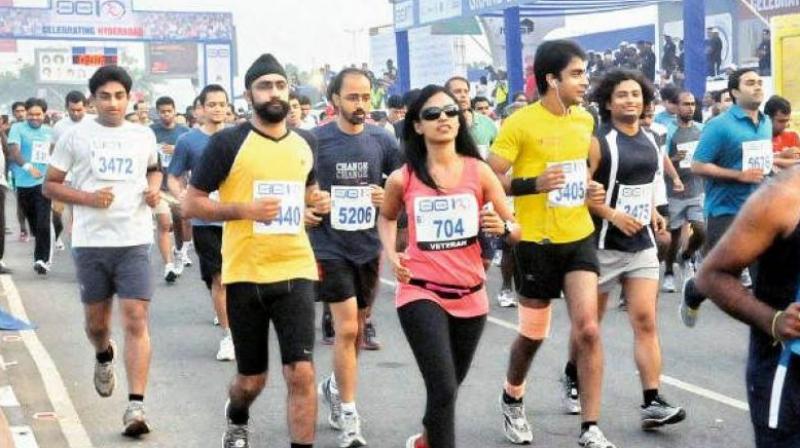Exercising in the smog

When exercise physiology researcher Luisa Giles noticed some wheeziness in her chest, she zeroed in on a possible culprit. “I’m an avid cycle commuter and really, embrace physical activity,” says Giles, a researcher at the University of British Columbia on Canada’s west coast. But she couldn’t help wondering whether her daily rides were doing more harm than good. So she decided to look into it.
Her study’s results, which were published in Medicine & Science in Sports & Exercise in 2014, offer a surprising twist in the recent debate about the safety of running marathons in India’s pollution-choked cities. In November, the High Court of Delhi said the government must warn runners about the dangers of running in the Delhi Half Marathon. But when it comes to mixing benefits of exercise with health risks associated with polluted air, Giles’s results suggest you may actually be better off breathing more deeply.
Breathing particulate-laden air triggers a cascade of inflammation and oxidative damage. On the surface, exercise takes that bad situation and makes it worse, because you’ll be sucking in more bad air. But trade-offs in the real world are often less clear: exercising in dirty air versus not exercising at all; or commuting by bike versus sitting on a bus travelling along the same traffic-clogged roads.
One question that Giles tackled was the effect of prior exposure before exercising in clean air — a situation that might occur if you respond to an air-quality alert by driving to a gym instead of exercising outdoors. They found that pre-workout exposure to polluted air raised heart rates during workouts by six or seven beats, showing that the body was still struggling with pollution’s after-effects. Another crucial consideration is that exercise itself has powerful anti-inflammatory and antioxidant properties.
In a study published in 2012, Brazilian researchers exposed mice to diesel exhaust for five weeks. Those that didn’t exercise showed high levels of lung inflammation; but those that exercised five times a week in the fumes were almost completely protected. Of course, not all exercise has the same effects. In her latest study, Giles had 18 healthy volunteers cycle in a chamber for 30 minutes at a time at low or high intensity, while breathing either clean air or air containing busy street levels of diesel exhaust.
At the lower exercise intensity, diesel fumes increased the amount of energy needed. The total volume of air inhaled per minute rose from 39.9 litres in clean air to 44.5 litres with diesel added. But at the higher exercise intensity, which corresponded to a moderate but sustainable effort, there were no differences in respiratory or metabolic response between the clean air and the dirty air.
Why would pollution cause problems during easy but not hard exercise? The study isn’t able to answer this question, but Giles suggests that different patterns of airflow within the lungs may play a role. Heavier breathing may speed the diesel particulates past irritant receptors in the central airways without triggering them. The findings may be particularly important for people with heart and lung conditions that stop them from exercising at higher intensities, Giles notes. For healthy people, Giles’s study adds to an increasingly complex picture that doesn’t lend itself to absolute statements about when you should or shouldn’t exercise in polluted air. The best approach, she says, is to minimize exposure during workouts. For example, the air’s cleaner early in the morning.
But if you find yourself biking down a busy street and wondering whether you should stop, don’t panic. The best option of all, it turns out, may be to pedal even harder.
The writer is a Toronto-based distance runner and postdoctoral physicist. He is the author of Which Comes First, Cardio or Weights? Fitness Myths, Training Truths, and Other Surprising Discoveries from the Science of Exercise

